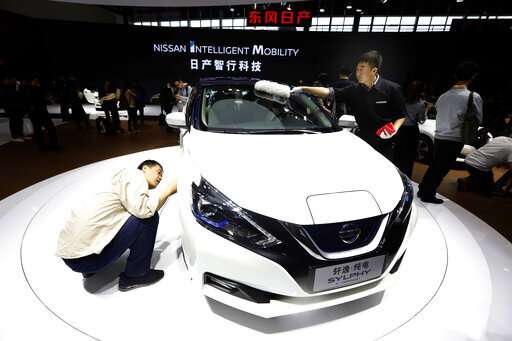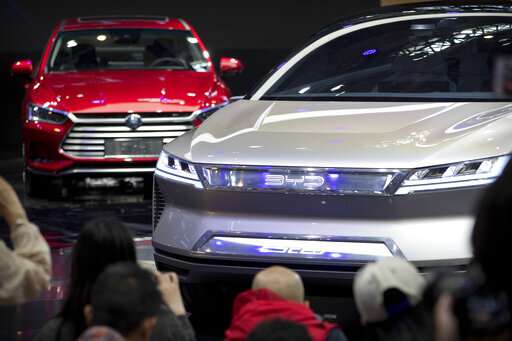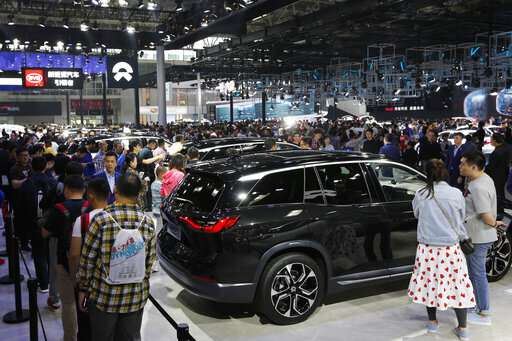China's auto show highlights electric ambitions

This year's Shanghai auto show highlights the global industry's race to make electric cars Chinese drivers want to buy as Beijing winds down subsidies that promoted sales.
Communist leaders are shifting the burden to automakers by imposing mandatory sales targets for electrics, adding to financial pressure on them amid a painful sales slump. Chinese purchases of pure-electric and hybrid sedans and SUVs soared 60% last year to 1.3 million—half the global total—but overall auto sales shrank 4.1% to 23.7 million.
Buyers of electrics were lured with subsidies of up to 50,000 yuan ($7,400) per car, but that support was cut by half in January and ends next year.
"Competition is getting more fierce," said industry analyst Paul Gong of UBS.
Communist leaders have been promoting electrics for 15 years in hopes of cleaning smog-choked Chinese cities and gaining an early lead in a promising industry.
General Motors, Volkswagen, Nissan and other global majors are developing models to suit Chinese tastes. They have money and technology, but local rivals have experience: brands including BYD Auto and BAIC Group have been selling low-priced electrics for a decade.
At the Shanghai show, which opens to the public Saturday, automakers plan to display dozens of electrics, from luxury SUVs to micro-compacts priced under $10,000. They aim to compete with gasoline-powered models on performance, cost and looks.
By the end of next year, "it will be very difficult for a customer to decide against an electric car," said the CEO of Volkswagen AG, Herbert Diess.
"The cars will offer roominess, space, fast charging," Diess said during a January visit to Beijing. "They will look exciting."
Automakers are looking to China, their biggest global market, to drive revenue growth at a time when U.S. and European demand is flat or declining. That gives them an incentive to cooperate with Beijing's campaign to promote electrics.

This week, General Motors Co. is unveiling the first all-electric model in Buick's China-only Velite range, which includes a hybrid based on the Chevrolet Volt. VW will display a concept SUV as part of plans to launch 50 electric models by 2025.
Nissan Motor Co. and its Chinese partner will display the Sylphy Zero Emission, an all-electric model designed for China that went on sale in August. BYD Auto will display an all-electric sedan with an advertised range of 400 kilometers (250 miles) on one charge.
Pressure to shift to electrics is "more an opportunity than a threat" to Chinese automakers, said UBS's Gong.
Latecomers to gasoline-powered vehicles, Chinese brands account for just 10% of global sales, mostly in low price tiers, Gong said. But they account for 50% of electric sales worldwide.
"In the EV world, Chinese companies started earlier and reacted faster," said Gong.
The ruling Communist Party has spent billions of dollars on research grants and incentives to buyers. State-owned power companies have blanketed China with 730,000 charging stations, a vastly larger network than any other country.
Meanwhile, automakers are struggling to revive sales of traditional SUVS, minivans and sedans that fell last year for the first time in three decades.
A tariff war with Washington and weakening economic growth made jittery consumers reluctant to commit to big purchases. That skid worsened this year. First-quarter sales shrank 13.7% from a year earlier.
Despite that, people in the industry say Chinese sales could top 30 million vehicles a year by 2025.
Ford relaunched its China operation this year after 2018 sales plunged 37%. The company blamed an aging product lineup.

Global brands are linking up with Chinese partners with experience at low-cost production.
Ford has an electric venture with Zotye Auto. GM and its Chinese partners plan 10 electric models by next year. Mercedes Benz launched the Denza brand with BYD. VW's electric joint venture, SOL, started selling an SUV last year.
Under the new system, automakers must earn credits for sales of electrics equal to at least 10% of purchases this year and 12% in 2020. Automakers that fall short can buy credits from competitors that exceed their targets.
Regulators say targets will rise later.
An electric's sticker price in China still is higher than a gasoline model. But charging and maintenance cost less. Industry analysts say owners who drive at least 16,000 kilometers (10,000 miles) a year save money in the long run.
China's biggest SUV brand, Great Wall Motors, has responded to the sale quotas by launching an electric brand, Ola. Its R1 compact, while looks like a toy beside Great Wall's hulking SUVs, went on sale in December priced as low as 59,800 yuan ($8,950) after the subsidy.
In a move to spur competition, Beijing lifted ownership restrictions on electric automakers last year.
Tesla Ltd. responded by announcing plans to build its first factory outside the United States in Shanghai.
Official ambitions clash with the Chinese public's love of bulky SUVs, seen as the safest option on crowded, bumpy streets. But sentiments are shifting.
A UBS survey found 71% of Chinese buyers are willing to try an electric, up from 58% a year ago. The rate for the United States and Europe was below 20%.
"Customer willingness is always higher in China," said Gong.
© 2019 The Associated Press. All rights reserved.















